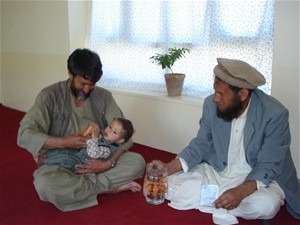
Sayed Nazir (right) advises the benefit of oral rehydration solutions for the treatment of diarrhea and dehydration to the father of a child with diarrhea.
USAID
Trained community members prevent illness and provide medical care in rural areas.
10 DECEMBER 2009 | BAMYAN, AFGHANISTAN
Afghanistan is a large and diverse country where most citizens live in small, rural villages. Providing health care in these areas is a challenge due to poor roads, security concerns, insufficient medical facilities, and a lack of female healthcare providers in remote areas. Nevertheless, community health workers (CHWs) – male and female volunteers trained to deliver basic healthcare – are improving the health of their fellow Afghans around the country.
Afghanistan has more than 43,500 community health workers, nearly 40 percent of whom were trained by USAID. These trusted community members provide essential services such as first aid and treatment of common diseases. In areas where doctors – especially female doctors – are scarce, their ability to provide prenatal care and family planning advice prevents serious health complications for mothers and infants.
CHWs are members of the communities in which they operate, ensuring trust and allowing them to develop deep, lasting relationships with their patients. This not only makes them more effective at treating and preventing illness, but also enables them to identify and address community-wide health threats.
In one village in Bamyan province, the efforts of a husband and wife team of community health workers have had a significant positive impact on the health of young children. After attending a six-month USAID training program, the team launched an initiative to reduce the number of diarrhea cases in children under the age of five. The illness is a serious health threat in Afghanistan, where the combination of sickness and dehydration often leads to death. In the previous year, there had been more than 250 episodes of acute diarrhea affecting the approximately 130 young children in the village.
The husband and wife team visited each household with young children to explain the importance of good hygiene practices in preventing illness. They stressed the need for frequent hand washing and drinking from clean sources of water. They also taught parents how to use oral rehydration salts to help children recover from diarrhea.
A chart on the wall of their home showed the impact of their work – far fewer children suffered from diarrhea in 2008 than in the previous year. The efforts of the community health workers, combined with the villagers’ willingness to adopt new habits, led to healthier children and happier families.







Comment
Make a general inquiry or suggest an improvement.